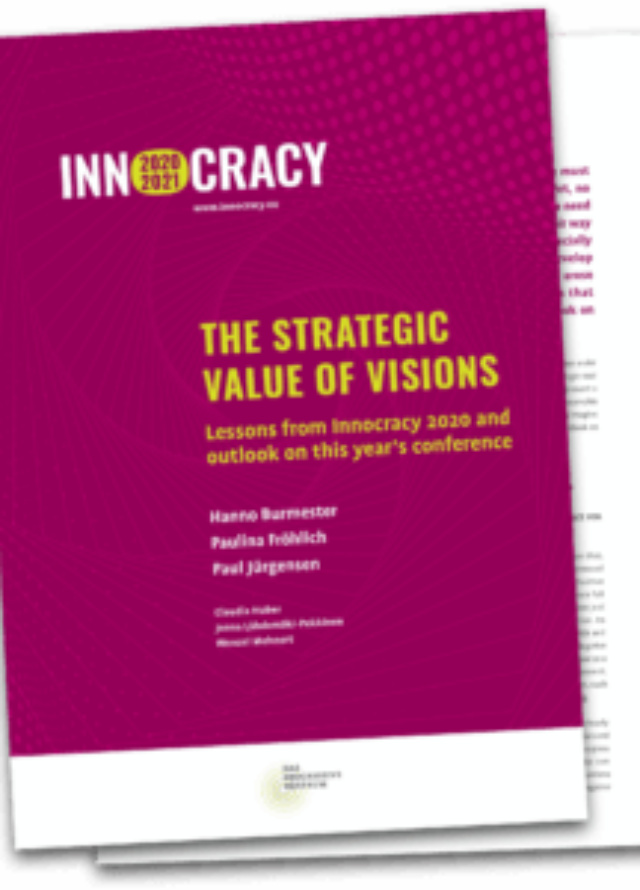Summary
In the face of systemic challenges such as the climate crisis, we must transform the way we live, consume and produce as societies. Yet, no transformation can succeed without a clear sense of direction. We need visions of the future that unify and integrate democracies on their way forward. But can visions really help to open up the future – especially in times of crises? How can we learn to imagine and learn to develop visions that are tangible?
The paper „The Strategic Value of Visions: Lessons from Innocracy 2020 and outlook on this year’s conference“ discusses key questions that arose at Innocracy 2020, presents avant-garde methods and projects that were at the core of last year‘s conference and ends with an outlook on Innocracy 2021.
The authors explain why visions for the future matter: „The more perceptible and tangible a vision is in the present, the better it can serve its function of giving inspiration, orientation and direction.“ Additionally, Claudia Huber, Jenna Lähdemäki-Pekkinen and Wenzel Mehnert contribute to the debate and add their hands-on experience.
About Innocracy
Innocracy is a European civil-society conference based in Berlin. Since 2017, once a year, Innocracy explores innovations in democracies. From reflections on the status quo, via practical examples of change to painting tangible future visions, the conference seeks to improve liberal democracy from the inside out. Innocracy is known for its community character, innovative formats and future-oriented debates.
In 2020, a digital version of Innocracy focused on future visions of more just democracies and their strategic value for societies in transformation. Under the title “Bringing the Future Back to Democracy”, more than 30 partner organisations, 60 speakers and 1000 participants experienced three days of keynotes, toolbox classes, vision sprints and panel discussions.
We believe, for the 2020s to become a decade of transformation, they have to become a decade of democratisation, too. At Innocracy 2021, we want to identify fields which are excluded or are being removed from democratic control and explore whether and how (re-)democratising them could lead to a better future. Register now and join us for Innocracy 2021 in Berlin or online.
Autor:innen
The Majority is Convinced: New German Administration is Future-Oriented
Democratising Democracy: No Transformation without Democratisation
Paving the Way Towards Common Values
“Creeping into Power” analyses historical interpretations of the New Right
The Disregarded
Full Speed Ahead: Progress in 2022+ – A Decade for a Just Transformation
Democratising Democracy: No Transformation without Democratisation
Democracy Lab Final Report
Democracy Lab Final Report
Democracy Lab Progress Report 2017/2018
Beyond (this) democracy — Seven sketches towards a new democratic purpose
Anthology on Democratic Innovation

Content

We develop and debate progressive ideas and bring together leading actors who turn thoughts into action. Our think tank’s goal: making the just transformation a reality. ▸ Learn more



